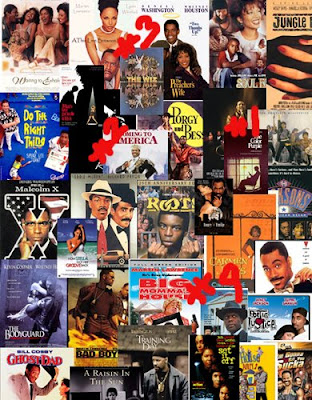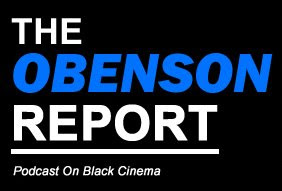
MAILBAG - Defining "Black Cinema"

During my last podcast recording, I requested listener input on how each of you chooses to define "black cinema," or whether a definition was at all necessary, especially at this juncture.
Since then, I've received a few email responses, and I hope those of you who haven't done so will share your thoughts on the matter - whether on this blog, on my podcast, or via email (talk@obensonreport.com).
I believe in the importance of having this discussion, and want to engage as many of you as possible. Reaching a solution isn't my goal, because I don't think we will ever get to true a consensus on the issue. The journey taken as we deconstruct the classification is of more value.
Starting today, I will share some of the responses I've received since posing the question on my podcast (minus the names of the senders, of course... unless they say otherwise).
Here's the first of many (share your thoughts below):
In response to your question on "Black Cinema"
The subject matter of the label "black cinema" and "black film makers" and whether these labels/definitions continue to be relevant in the 21st century. The other question posed was, does the concept of "blackness" or "what is black", also need be defined/redefined. Overall the concept of "blackness" itself seemed to be in question within the posed questions for future discussions.
I understand your angst over these subjects – but the truth of the matter is no people can escape their own history, nor can they reconstruct the consequential events created by that history. That however does not negate the desire to remove these historical "shackles" so that we can get on with simply being human beings. However, within the context of the cinematic milieu, if one is to create a cinema based upon one's own physiological construct, the ultimate question is can one escape from oneself.
Black people did not invent themselves as "black" with all its raging unrelenting connotations, historically or currently. Nor did black people create black cinema, or "race pictures", or "colored pictures", or "jungle music". Nevertheless, these concepts have stuck similar to the way the concept "nigger" has stuck. Put another way, in order to change poison to medicine, one must become an alchemist. Like taking chitterlings and making them into a delicious delicacy. It all boils down to how you present it.
Your question(s) feels like they are coming from someone carrying a heavy burden. I mean, for example does this conversation also apply to the "Japanese cinema", or the "Indian Cinema", or the "Italian Cinema". And if not, why not? While I understand the "burden" (if that is an appropriate description) of re-defining what "black cinema" or "African American Cinema", or "African Cinema", or even "American Cinema", what all these turns mean within the body politic of cinema overall. The power of the cinematic image and its influence on the human physic cannot be denied or underestimated in it's various agendas, both historically and currently. For example, the fact that no black male hero film has ever received an academy award, speaks volumes to this discussion of blacks in American cinema. While both, "Malcolm X", and"Ali" received nominations, neither was awarded. However, subsequent awards were given to Washington for portraying lesser characters.
Again, while this topic of the relevancy of the term "black", including the first "black" president of the United States, all have a direct link to the history of a country and a people. These realities are undeniable. How this generation of black filmmakers struggle with these realities remains to be seen. However, I encourage each one to endeavor to discover the power in the word "black" rather than to feel limited by it. While I understood Gordon's (Parks) position on black filmmakers being able to make films about Russians, and whomever else. However the old philosophy that insists that the best stories are those told from one's own experiences, still rings true. That does deny the universality of the human experience; nevertheless it is the authentic spirit that shines through a story told from the authentic self. That self is truly the thing in question here is it note, the question you've pose concerning the relevance of the term "black cinema".
There was a time when black people could not even feel good about having their photographs taken because of their retched life conditions. And than along came James Van Derzee, a "black photographer" whose photographs redefined who black people were. He found the beauty and the power in the black image.
I challenge young aspiring African American filmmakers to not only embrace being black, and begin to redefine what black cinema is. I challenge them to make incredible films about their life experiences, and about the world from their points of view. I challenge them be audacious enough to say that being black is still relevant in the 21st century, and to not succumb to illusion of being something other than who they are. They are Africans in America, and until the world rids itself of the atrocities of in humanity towards "colored people', or is "people of color", or "people of non-color", which ever physiological spin fits the current vogue, at the end of the day it is what it is.
Perhaps your next quarry will be, 'how do we turn make black cinema the new cinema in America. Perhaps someone should ask the new black President that question. In case you haven't noticed, black is in, at least in the White House.
Thoughts? More to come later...


Maybe an idea related to this discussion, maybe not - the person who creates an idea or a label or category perhaps has greater control or effect on the world (as far as re-organizing the world) then the person who tries to fit into an idea created by someone else - an idea that may or may not be applicable to them because of the individual's choices, qualities or the time in which they live compared to the time period & realities when the idea/label was constructed.
In the past many human individuals were prohibited, through the use of force, punishment of death or fear of same, from doing things that others did not want them to do - ultimately it often comes down to one group of people wanting a monopoly over choice land or lucrative activities - for example - African-Americans being denied education in the past - the effect being it is easier to control, subjugate, or compete with & win against uneducated people.
I would not lightly buy into a label created for me by people who treated people who look like me as far less than human. It may not be a psychological game that is stacked in my favor, probably quite the opposite.
But that's just me, I've always found it more useful for me to approach things as a human individual who will draw my own boundaries - suits me well, better than approaching it as a member of a group as defined by outsiders/one time oppressors of that group.
Ultimately I think humanity is a colection of individuals, not groups.
So, as an individual filmmaker, each filmmaker should interpert their existence or should portray their view of the world in a way faithful to their own direct experience - probably will result in a lot of different & interesting movies.
But I can see how, to people to whom membership in a certain group - being black, white, brown, etc. - is a very important part of their identity - how they would feel a strong need to speak for the group or elevate or defend the group - and how that need would be greater to them than their own personal, direct experience - specially if their direct experience reveals items that may be critical of the group's positive vision of themselves.
So, maybe, regardless of how any tye of group (ethnic, national, racial, etc.) cinema is defined - individual filmmakers who can tell a unique story that resonates beyond the political labels (race, nationality, etc.) would - their work would - appeal to lots of humans, many different kinds of humans - possibly - that might be the bright side - however Black Cinema is defined, some very interesting work could come from individual filmmakers from that group who are faithful to their experience or are skilled in sharing their experience & views with others through the tools of cinema.
Well, let me stop here, I am probably way off topic by now :)
- Sujewa
You're not off-topic. It's all relevant.
Race is a man-made construct - one that divides the species, much to our detriment.
Individuality, unfortunately, isn't encouraged. But conformity is.
I, and many others like me refuse to be classified, or limited by some set list of criteria created by some person or group wielding some amount of power and control. We are too vast and varied a people to allow ourselves to be painted so monolithically.
I do welcome the struggle some black filmmakers have chosen to bear, by attempting to deconstruct the classification (black cinema). I just don't want it to become the reason for every film's being - specifically every film by black filmmakers.
And, unfortunately, since the category already exists, every film with predominantly black casts is automatically relegated to that single category, and all that being under that umbrella connotes, which often is more damaging to the film than helpful.
I realize the futility in trying to define the term, because it then forces one to have to first define what "blackness" is.
Ideally, none of this would be topics of discussion; alas, this is the world in which we live. However, I'd like to, if not destroy, then maybe blow the doors wide open on what it all means; and so, maybe the emphasis would be on RE-defining "black cinema" as opposed to DEfining it.